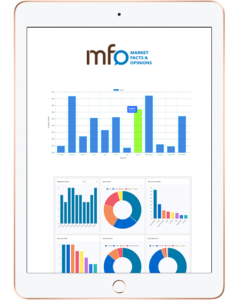
Services
Market Research
MFO conducts both types of market research: quantitative and qualitative research. It is often debated which type of research is more effective however neither is better than the other—they both have their own strengths and weaknesses. Quantitative and qualitative research when used in tandem - mixed methods research - provide a complete picture.
Quantitative Research
Quantitative methods emphasize objective measurements and the statistical, mathematical, or numerical analysis of data collected through the use of questionnaires. Quantitative research focuses on gathering numerical data and generalizing it across groups of people or to explain a particular phenomenon.
Qualitative Research
The emphasis is on the qualities of entities and on processes and the meanings that are placed on them. This type of research explores attitudes, behaviour and experiences It seeks to understand the value-laden nature of inquiry, answering questions that stress how the social experience is created and given meaning. It is different from quantitative studies, which emphasize the measurement and analysis of causal relationships between variables. Qualitative research addresses the processes that underpin the relationships.

Mixed Method Research
This method of research combines the two other strands, gaining the strengths from both. It provides more breadth and depth of understanding of the subject area than either quantitative or qualitative can on their own. This approach is useful to gain an understanding of an issue by using more than one vantage point to appreciate its nuances. It can help to clarify unexpected findings or to resolve what may appear as contradictory results. It allows for clarification and elaboration of initial research findings.
Research Tools
Our stringent methodologies include a mix of quantitative and qualitative research techniques.
Employee Satisfaction

Employees are in a sense internal customers in any organization and as such their satisfaction is also important to the success of the business.
This objective of this type of study is measure employee satisfaction with their interaction with employees of the company both those they manage and those who manage them. Moreover this study determines the specific needs and expectations of employees with respect to their working environment and internal processes.
Case Studies:
Mystery Shopper

This type of study monitors service through the eyes of a customer. During mystery shopping the researcher-customer experiences and evaluates the service, providing a benchmark for measuring the dynamics of the customer experience.
A mystery shopper exercise can identify trouble spots before they become bigger problems. Better service means greater customer retention and more business from existing customer. Mystery shopper exercises also can be used to gauge your level of service in comparison with that of the competitors.
Case Studies:
Concept Development

This refers to the refining and defining of the basic idea of a product. Concept development studies provide guidance on the communication of benefits, uses, packaging, advertising, sales approaches, distribution and pricing.
With adequate concept testing, you avoid false starts, wrong position, false strategy and marketing to the wrong target groups.
Case Studies:
Corporate Image

This type of study evaluates respondent perception of an organization. This may be perception of management practices, corporate citizenry, involvement in national and community affairs, use of innovation and technology as well as financial strength.
Such studies can measure how organizations are perceived against their competitors and other corporations.
Case Studies:
Location Feasibility

This type of study defines the relationship between a proposed project and its community. It determines whether the demand and social context is suitable to ensure the viability of a project. Additionally this type of project can also determine the impact of a planned project on its community.
Case Studies:
Mass Media Research

A mass media study, MEDIATRAK, was introduced in 1992 with the objective to help advertisers and users of the media make strategic decisions about issues related to media consumption and to help with advertisement and programme placement.
MEDIATRAK results provide ratings and audience share of television programmes, radio stations and newspapers as well as demographic profiles of viewers, listeners and readers. In 2007, 2009 and 2012 the MEDIATRAK was commissioned by the Association of Advertising Agencies of Trinidad and Tobago (AAATT).
Case Studies:
Taste Tests

Taste Tests help to provide an assessment of the taste of a specific brand in comparison with its competitors and enables researches to hone in on consumer preferences.
Tastes tests also can help to measure consumer acceptance of new product formulations and determine which attributes of the product should be tweaked.
Case Studies:
Habits & Attitudes

This type of study examines the incidence, occasions and frequency of usage of a product or service. A habits and attitudes study can also determine the demographic profile of users and non-users.
This kind of research also explores the dynamics of purchase and provides background on brand awareness, selection, motivators, loyalty as well as attitudes towards top market brands.

